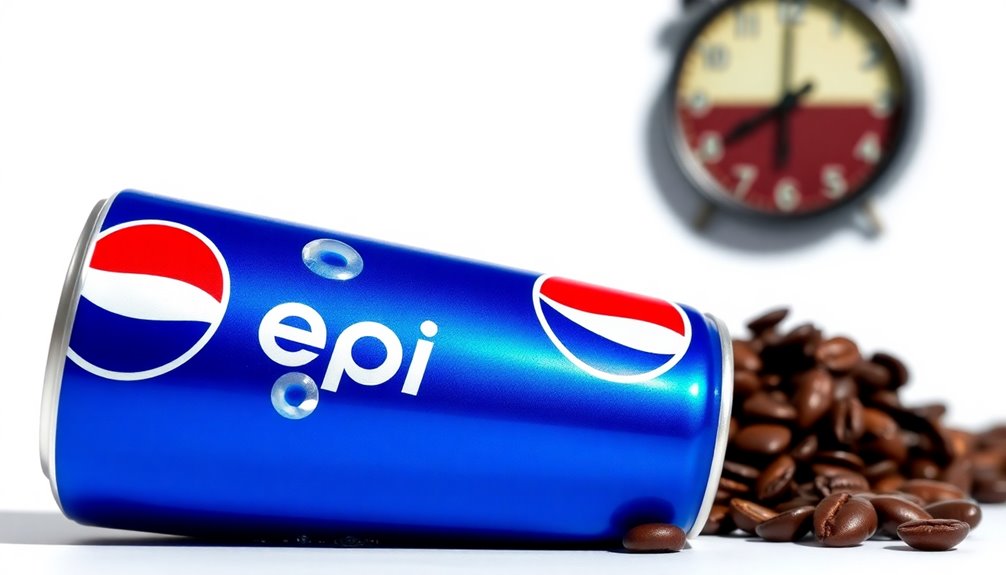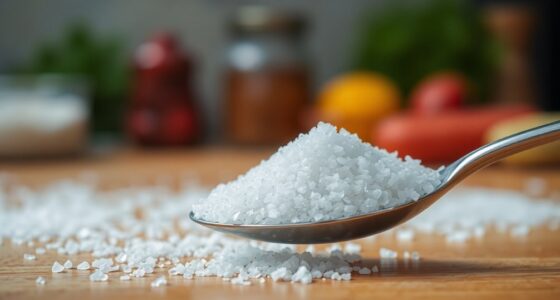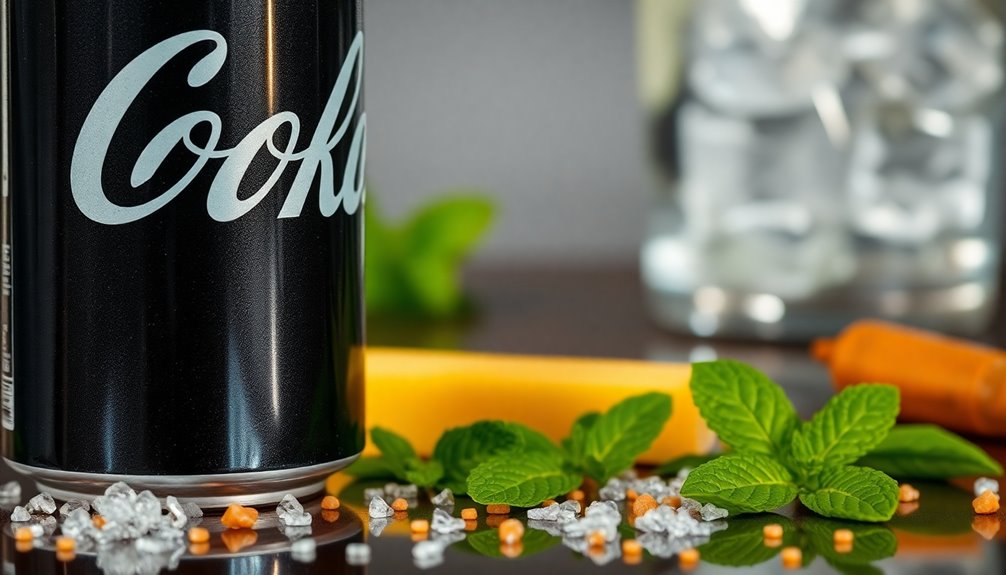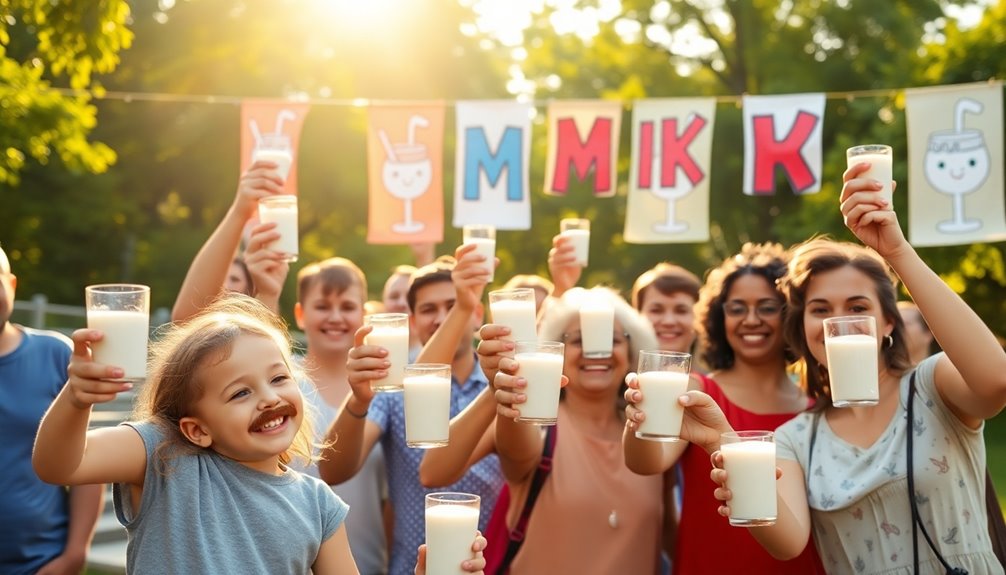You might be surprised to learn that Pepsi's caffeine content is lower than coffee, yet still significant compared to other sodas. A 12 oz serving of regular Pepsi contains about 38 to 39 mg of caffeine. In comparison, Diet Pepsi has around 35 to 36.7 mg. While that's lower than the average cup of coffee, which packs 95 mg in just 8 oz, it can still give you a decent boost. If you're curious about how this compares to other beverages or what that means for your health, there's a lot more to explore beyond just these numbers.
Key Takeaways
- Diet Pepsi contains 35-36.7 mg of caffeine per 12 fl oz, making it lower in caffeine than many other beverages.
- Regular Pepsi has slightly more caffeine, ranging from 38-38.9 mg per 12 fl oz.
- Pepsi Zero has the highest caffeine content among Pepsi products, with 69 mg per 12 fl oz serving.
- Caffeine in Pepsi is significantly lower than average coffee, which has 95 mg per 8 oz serving.
- Awareness of caffeine content in beverages, including Pepsi, is essential for managing intake and health effects.
Caffeine Content in Diet Pepsi

When you reach for a Diet Pepsi, you're getting about 35 to 36.7 mg of caffeine per 12 fl oz serving. This makes the caffeine content in Diet Pepsi a moderate choice compared to other soft drinks.
In fact, it contains about 2.9 mg of caffeine per fluid ounce, which is lower than Diet Coke's approximately 46 mg per 12 fl oz.
It's worth mentioning that the caffeine in Diet Pepsi is synthetic, unlike the natural caffeine found in coffee.
If you prefer a little more kick, regular Pepsi contains slightly more caffeine, ranging from 38 to 38.9 mg per 12 fl oz.
While the caffeine content may vary by batch and location, it typically stays within this range.
Health Impacts of Caffeine

Although caffeine can boost your alertness and reduce fatigue, its health impacts vary considerably from person to person. Some of you might've caffeine sensitivity, experiencing negative effects like anxiety and insomnia even at lower doses.
For most adults, moderate consumption of 200-400 mg per day is generally recognized as safe, but exceeding that can lead to symptoms such as restlessness and rapid heart rate.
Additionally, if you regularly consume diet sodas like Diet Pepsi, be aware that they contain artificial sweeteners like aspartame, which have sparked debates about long-term safety and potential digestive issues. Recent studies have raised concerns about the effects of frequent consumption of artificial sweeteners on gut health and metabolism. It’s important to be mindful of your intake of these additives and consider reducing consumption if you experience any adverse effects. If you are cautious about the potential health risks associated with artificial sweeteners, you may want to take a closer look at Coke Zero ingredients before making it a regular part of your diet.
Choosing beverages wisely is essential, as diet sodas often lack nutritional benefits compared to natural options. Stay mindful of your caffeine intake!
Comparing Caffeine Levels

Understanding caffeine levels in beverages helps you make informed choices about your consumption.
When comparing caffeine levels across Pepsi products, you'll notice some interesting variations:
- Diet Pepsi: 35-36.7 mg per 12 fl oz
- Regular Pepsi: 38-38.9 mg per 12 fl oz
- Diet Coke: 46 mg per 12 fl oz
- Pepsi Zero: 69 mg per 12 fl oz
Notably, coffee averages about 95 mg of caffeine per 8 oz, showing that sodas generally have lower caffeine content.
Additionally, citrus sodas, like Sunkist, can surprise you with higher caffeine levels—41 mg per 12 oz.
Consumer Preferences and Trends

As consumers become more health-conscious, preferences are shifting toward beverages that provide a balance of flavor and lower calories.
Diet Pepsi has emerged as a popular choice for those seeking a caffeine boost without the added sugars found in regular soda. With a caffeine content of approximately 35-36.7 mg per 12 fl oz, it stands out as a moderate option, appealing to those mindful of their caffeine intake.
Many appreciate Diet Pepsi's taste while still wanting a caffeine option, reflecting a growing trend for health-conscious beverages. The rising demand for diet and low-calorie drinks influences consumer preferences, making Diet Pepsi an attractive choice, especially when compared to alternatives like Diet Coke, which has higher caffeine levels. Additionally, the use of air purifiers in homes contributes to a healthier living environment, further supporting the trend toward wellness-focused consumer choices.
Regulatory Labeling Practices

With the growing emphasis on health-conscious choices, it's important to understand how regulatory labeling practices shape your beverage options.
The FDA regulates caffeine as a food additive in soft drinks, allowing up to 71 mg of caffeine per 12 fl oz without special labeling. This means:
- Caffeine amounts must be clearly labeled.
- Labels include caffeine from all sources.
- Diet Pepsi contains approximately 35-36.7 mg of caffeine per 12 fl oz.
Increased demand for transparency has led brands like Pepsi to voluntarily disclose caffeine amounts.
These regulatory labeling practices guarantee you're informed about the caffeine content in your drinks, empowering you to make healthier choices based on what you consume.
About Caffeine and Its Sources

Caffeine, a naturally occurring stimulant, plays a significant role in many of the beverages you enjoy daily.
You'll find caffeine in coffee beans, tea leaves, kola nuts, and cocoa beans, among other plants. It adds a slightly bitter taste that enhances the flavor of soft drinks like Pepsi, balancing out their sweetness.
Additionally, caffeine can be artificially synthesized for use in various products. Common sources include coffee, tea, chocolate, and energy drinks, with caffeine levels varying widely across these options.
The FDA regulates caffeine in soft drinks, allowing up to 71 mg per 12 fl oz without special labeling. Given its popularity, caffeine is one of the most studied food ingredients, generally considered safe for most adults, although sensitivity varies.
Caffeine Safety Guidelines

How much caffeine is safe for you? The caffeine safety guidelines suggest that moderate consumption of 200-400 mg per day is generally safe for most adults, translating to about 5-10 servings of Diet Pepsi.
However, individual sensitivity varies, so it's vital to be aware of how your body reacts. Here are some things to take into account:
- Pregnant women should consult healthcare providers for personalized advice.
- Caffeine-sensitive individuals may need to limit their intake.
- The FDA allows up to 71 mg of caffeine per 12 fl oz in soft drinks without special labeling.
- Watch for excessive caffeine, which can lead to anxiety, insomnia, and increased heart rate.
Stay informed about the caffeine content in your favorite beverages to guarantee you're within safe limits!
Caffeine Content Labeling

Clear and accurate caffeine content labeling is essential for consumers who want to keep track of their intake. The FDA mandates that beverages like Pepsi clearly display caffeine amounts on their packaging, ensuring you're aware of what you're consuming.
Typically, Pepsi contains around 35-36.7 mg of caffeine per 12 fl oz serving, which may be lower than some other sodas but still significant for those monitoring their caffeine consumption.
With the FDA allowing up to 71 mg of caffeine per 12 fl oz without special labeling, transparency in labeling becomes vital. As consumer demand for clarity grows, Pepsi has started including caffeine amounts on product labels, helping you make informed choices about your caffeine content and consumption.
Industry Trends in Caffeine

As consumers become more aware of what goes into their drinks, the beverage industry is responding with innovative offerings that cater to these preferences.
You're likely noticing a shift in how brands approach caffeine content, especially with the rise of low-calorie options. Here are some key trends:
- Companies are introducing coffee-infused sodas, like Pepsi Café, to boost caffeine levels.
- More brands are transparent about caffeine content on labels.
- Diet beverages are being reformulated to appeal to health-conscious drinkers.
- The demand for functional beverages is growing, marrying flavor with caffeine benefits.
These trends reflect a broader movement towards healthier choices, allowing you to enjoy the kick of caffeine without the extra calories. Additionally, many consumers are exploring self-directed IRAs to invest in companies that align with their values, including those producing innovative beverage options.
Non-Soda Beverage Alternatives

Looking for invigorating alternatives to sodas? You might want to explore non-soda beverage alternatives that offer a healthier caffeine boost.
Green and black tea are great choices, containing 20-70 mg of caffeine per 8 oz, providing a more natural source than sugary sodas. If you need something stronger, coffee delivers an impressive 95 mg of caffeine per 8 oz, perfect for that highly caffeinated kick.
For a caffeine-free option, herbal teas offer delightful flavors and health benefits. Certain herbal teas may also help suppress appetite during fasting, making them a great choice for those looking to maintain their wellness goals. Meanwhile, sparkling water infused with natural flavors serves as a rejuvenating, zero-calorie alternative without the pitfalls of added sugars.
Just be cautious with energy drinks; while they can be highly caffeinated, they often come with high sugar and artificial ingredients.
Frequently Asked Questions
Is Pepsi High in Caffeine?
Pepsi isn't considered high in caffeine when you compare it to other beverages.
Regular Pepsi contains about 38-39 mg of caffeine per 12 fl oz, while Diet Pepsi has slightly less at 35-37 mg.
When you look at coffee, which has around 95 mg per 8 oz, you'll see that both types of Pepsi have considerably lower caffeine levels.
What Has More Caffeine, Pepsi or Coffee?
When you compare caffeine levels, coffee definitely packs a bigger punch than Pepsi.
A standard 12 fl oz serving of regular Pepsi contains about 38 mg of caffeine, while an 8 oz cup of coffee averages around 95 mg.
If you're looking for a quick boost, coffee's your best bet.
Energy drinks can be even stronger, but between Pepsi and coffee, coffee's the clear winner when it comes to caffeine content.
Which Soda Has the Most Caffeine in It?
You might think your favorite soda's just a sweet treat, but surprise! It can pack quite the caffeine punch.
Among the popular sodas, Pepsi One takes the crown with 57 mg of caffeine per 12 oz serving. Mountain Dew isn't far behind, boasting 55 mg.
If you're looking for more caffeine, steer clear of Diet Pepsi, which only has about 35-36.7 mg.
Is the Caffeine in Pepsi Enough to Keep You Awake?
The caffeine in Pepsi mightn't be enough to keep you awake if you're looking for a significant boost.
With about 35-36.7 mg per 12 fl oz serving, it's lower than what you'd find in coffee. If you consume it in small quantities, you may not feel much difference.
While it's safe for moderate consumption, if you need a strong energy kick, you might want to explore other options like energy drinks.
Conclusion
In exploring Pepsi's caffeine content, you've uncovered not just numbers, but health impacts, consumer trends, and industry practices. You've discovered that understanding caffeine isn't just about consumption; it's about making informed choices. Whether you prefer Diet Pepsi or alternative beverages, knowing what fuels your body helps you lead a healthier life. So, as you sip your favorite drink, remember: awareness empowers, knowledge enlightens, and choices shape your well-being. Stay informed, stay healthy, and enjoy every sip responsibly.










